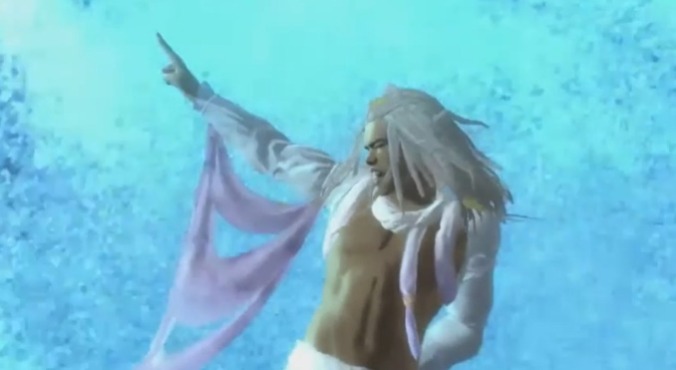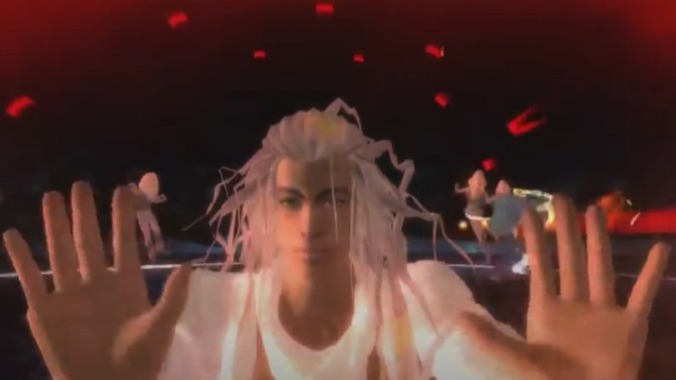Frequently, at the end of a videogame level, there’s a big dude who really wants to kill you. Boss Rush is a column about the most memorable examples of these, whether they challenged us with tough-as-nails attack patterns, introduced visually unforgettable sequences, or because they delivered monologues that left a mark. Sometimes, we’ll even discuss more abstract examples, like a rhetorical throwdown or a tricky final puzzle or all those damn guitar solos in “Green Grass and High Tides.”
The true heads have loved El Shaddai: Ascension of the Metatron since 2011. Ignition Tokyo’s game has nothing to do with the Amy Grant song; it’s an adaptation of the Book of Enoch, an apocryphal Hebrew text from a few hundred BC that was lost for centuries outside of Ethiopia and largely stricken from the Biblical record by both Judaism and Christianity alike. It’s not a typical subject for a videogame, and El Shaddai is in no way a typical game. It’s a brilliant exegesis of this ancient tale about fallen angels and their half-human progeny, as well as a thrillingly unpredictable exploration of the outer limits of videogame storytelling. It also, crucially for this column, has perhaps the most unforgettable boss battle I’ve ever played. Before we get to that, though, let’s talk about walls, and the breaking thereof.
El Shaddai breaks the fourth wall often and with impunity. Lucifel, the designer jean wearing hipster fallen angel that serves as the game’s primary guide, regularly talks not just to the character Enoch but directly to the player who’s controlling Enoch from the other side of the screen. Meta, post-modern indulgences like this were in no way novel in 2011; cartoons were doing it in the first half of the century, and The Jack Benny Show brought it to TV as far back as the late ‘40s. By 1990 it was commonplace even outside of comedy, with art as disparate as Martin Scorcese’s Goodfellas and Grant Morrison’s Animal Man directly addressing its audience. Even in games, 1998’s Metal Gear Solid and 2001’s Eternal Darkness, among others, teasingly broke down the barrier between a game world and real life. It’s a neat gimmick whenever the too-cool Lucifel speaks to the player, and it evokes the kind of esoteric mysticism often associated with apocryphal scriptures, but it’s nothing we hadn’t seen before El Shaddai hit our 360s and PlayStation 3s 13 years ago.
And then Chapter 7 comes along and pulls off a trick with its boss battle that, if not mind-blowing, is at least both shocking and awesome in equal measure.
Throughout El Shaddai, Enoch confronts a group of once-heavenly beings known as the Watchers. They’re angels sent from Heaven to watch over humanity, who couldn’t keep it in their pants and wound up laying (in the Biblical sense, obviously) with women on Earth. They also went full Prometheus and gave mankind all kinds of sacred knowledge they weren’t supposed to have yet. Their couplings with humanity produced the Nephilim—half-human, half-angel giants who generally make a mess of things and are Enoch’s main enemies throughout the game—and the Nephilim’s wanton destruction compels God to wipe everything away with a flood and start all over again. Enoch is sent down from Heaven to find the Watchers and let them know the flood is coming, perhaps not realizing how thoroughly the former angels have fallen.
Enoch, who is not a warrior by temperament or training, finds himself fighting his way through the Nephilim and lesser fallen angels. Most chapters end in a boss fight against one of the main Watchers, and while the first few are fairly rote encounters, this makes the end of Chapter 7 even more surprising and transcendent. It combines the game’s modernization of quasi-Biblical tales with its deeply meta nature into a sublime convergence of gaming and the spectacle of pop music.

One of the fallen angels in the Book of Enoch is named Armaros. One of the bosses in El Shaddai shares that name. That’s basically the only common thread between the two, though. When Armaros shows up at the end of Chapter 7, he’s not some demonic monster or a twisted vision of religious reverence. When Armaros shows up at the end of Chapter 7, he’s basically Michael Jackson. And the concert he’s performing isn’t just for the screaming audience in his own personal arena; it’s explicitly for the player of the game.
During the first phase of this fight, you can’t touch Armaros himself. It’s not uncommon for videogame bosses to sic waves of underlings on you before facing off with your character; Armaros does this here, but these mobs aren’t just violent thugs. They’re Armaros’s backup dancers. They tangle with Enoch with terpsichorean grace, as God’s messenger looks for openings in their dance moves to hit them with the game’s combo-based attacks. Enoch dance-fights through several waves before launching the battle’s far less interesting second phase, as Armaros continues to vamp and gyrate in time with his dance track.
Normally, in a fight like this, the boss is paying close attention to what their henchmen are doing. They might interject here and there, trying to help their goons out before fully entering the fray. That doesn’t happen here, though; Armaros could not care less about what his dancers are doing. He’s dancing in his own world the whole time, shimmying across the screen as the quarrel rages around him. He does intervene slightly without getting physical, and that becomes the most unexpected, most striking, and most post-modern part of the whole game. Instead of helping his dance crew take out Enoch, Armaros stares squarely at the player, thrusting towards them and blocking their view of the fight that they’re actively playing through. At a few points, he disappears entirely from the screen, only to creep up from below, mere inches from the screen, slinking about like a mime doing the “trapped in a box” routine, and almost completely obscuring the ongoing fight. The first half of your initial face-off with Armaros is less of a fight and more of a one-sided dance battle, with this sensuous pop star of a Watcher utterly disrespecting his angelic enemy.
Outside of the infamous Psycho Mantis trick in the original Metal Gear Solid, no moment has ever broken the fourth wall in a game as inventively as this boss fight. El Shaddai’s actual lead character fades into the background as Armaros looks deep into the player’s eyes with a seductive nonchalance that makes the fight happening behind him feel like a total afterthought. It’s a smart subversion of almost every boss battle ever in videogames, a clever pop culture crossover, and a playful escalation of the game’s meta twists.
Eventually, the dust-up with Armaros turns into a more traditional boss fight. The second phase ditches the inspired madness of the first to become something more familiar, more comfortable, and way less exciting. Armaros himself survives this battle, and becomes an occasional ally of Enoch’s who pops back up near the end. Throughout El Shaddai, Ignition never fully gives into its more abstract and formally ambitious inclinations; the fight with Armaros is the furthest out there this game gets. It’s still a deeply weird game, though, with frequently surreal images and a restless drive for a distinctive, innovative narrative best summed up by Enoch’s dance battle with a wall-breaking pop star demon and his backup dancer battalion. Sadly, the original 360 and PlayStation 3 versions of El Shaddai: Ascension of the Metatron aren’t backwards compatible with current consoles, but there’s an HD remaster on Steam that just came out on the Switch earlier this month. If you haven’t tussled with Armaros yet, there’s no reason to keep missing out on this bit of galvanizing videogame genius.
Senior editor Garrett Martin writes about videogames, comedy, travel, theme parks, wrestling, and anything else that gets in his way. He’s also on Twitter @grmartin.

